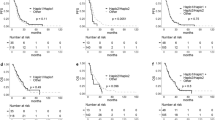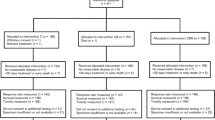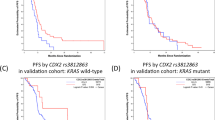Abstract
Pericytes are crucial for angiogenesis. The impact of pericyte function to bevacizumab efficacy in mCRC treatment has not been comprehensively examined. This retrospective study investigated germline polymorphisms in genes related to early pericyte maturation to predict bevacizumab efficacy in 424 patients of two clinical trials treated first line with FOLFIRI+bevacizumab. Eight single-nucleotide polymorphisms (SNPs) were tested for potential biomarker value: RGS5 (regulator of G-protein signaling 5; rs1056515, rs2661280), PDGFR-β (platelet-derived growth factor receptor-β; rs2229562, rs2302273), CSPG4 (chondroitin sulfate proteoglycan NG2; rs8023621, rs1127648) and RALBP1 (RalA binding protein 1; rs10989, rs329007). For progression-free survival (PFS), PDGFR-β (rs2302273) was able to define significantly different patient cohorts in uni- and multivariate testing. RALPB1 (rs329007) showed predictive value for tumor response. The C allele in RGS5 (rs2661280) predicted longer overall survival and CSPG4 rs1127648 was associated with differences in PFS, but for both value was lost when multivariate analysis was applied. A comprehensive statistical analysis revealed that the biomarker value of the SNPs was dependent on primary tumor location. This is the first study to identify pericyte germline polymorphisms associated with clinical outcome in mCRC patients treated first line with FOLFIRI+bevacizumab. The differences seen with regard to primary tumor location may lead to further research to understand the clinical outcome differences seen in right- and left-sided colon cancer.
This is a preview of subscription content, access via your institution
Access options
Subscribe to this journal
Receive 6 print issues and online access
$259.00 per year
only $43.17 per issue
Buy this article
- Purchase on Springer Link
- Instant access to full article PDF
Prices may be subject to local taxes which are calculated during checkout


Similar content being viewed by others
References
Goel S, Duda DG, Xu L, Munn LL, Boucher Y, Fukumura D et al. Normalization of the vasculature for treatment of cancer and other diseases. Physiol Rev 2011; 91: 1071–1121.
Folkman J, Shing Y . Angiogenesis. J Biol Chem 1992; 267: 10931–10934.
Folkman J . Tumor angiogenesis: therapeutic implications. N Engl J Med 1971; 285: 1182–1186.
Giantonio BJ, Catalano PJ, Meropol NJ, O'Dwyer PJ, Mitchell EP, Alberts SR et al. Bevacizumab in combination with oxaliplatin, fluorouracil, and leucovorin (FOLFOX4) for previously treated metastatic colorectal cancer: results from the Eastern Cooperative Oncology Group Study E3200. J Clin Oncol 2007; 25: 1539–1544.
Saltz LB, Clarke S, Diaz-Rubio E, Scheithauer W, Figer A, Wong R et al. Bevacizumab in combination with oxaliplatin-based chemotherapy as first-line therapy in metastatic colorectal cancer: a randomized phase III study. J Clin Oncol 2008; 26: 2013–2019.
Hurwitz H, Fehrenbacher L, Novotny W, Cartwright T, Hainsworth J, Heim W et al. Bevacizumab plus irinotecan, fluorouracil, and leucovorin for metastatic colorectal cancer. N Engl J Med 2004; 350: 2335–2342.
Budinska E, Popovici V, Tejpar S, D'Ario G, Lapique N, Sikora KO et al. Gene expression patterns unveil a new level of molecular heterogeneity in colorectal cancer. J Pathol 2013; 231: 63–76.
Stintzing S, Lenz HJ . Protein kinase inhibitors in metastatic colorectal cancer. Let's pick patients, tumors, and kinase inhibitors to piece the puzzle together!. Expert Opin Pharmacother 2013; 14: 2203–2220.
Harada K, Hiraoka S, Kato J, Horii J, Fujita H, Sakaguchi K et al. Genetic and epigenetic alterations of Ras signalling pathway in colorectal neoplasia: analysis based on tumour clinicopathological features. Br J Cancer 2007; 97: 1425–1431.
CancerGenomeAtlasNetwork. Comprehensive molecular characterization of human colon and rectal cancer. Nature 2012; 487: 330–337.
Boisen MK, Johansen JS, Dehlendorff C, Larsen JS, Osterlind K, Hansen J et al. Primary tumor location and bevacizumab effectiveness in patients with metastatic colorectal cancer. Ann Oncol 2013; 24: 2554–2559.
Lambrechts D, Lenz HJ, de Haas S, Carmeliet P, Scherer SJ . Markers of response for the antiangiogenic agent bevacizumab. J Clin Oncol 2013; 31: 1219–1230.
Bergers G, Song S . The role of pericytes in blood-vessel formation and maintenance. Neuro-oncology 2005; 7: 452–464.
Greenberg JI, Shields DJ, Barillas SG, Acevedo LM, Murphy E, Huang J et al. A role for VEGF as a negative regulator of pericyte function and vessel maturation. Nature 2008; 456: 809–813.
Gerhardt H, Golding M, Fruttiger M, Ruhrberg C, Lundkvist A, Abramsson A et al. VEGF guides angiogenic sprouting utilizing endothelial tip cell filopodia. J Cell Biol 2003; 161: 1163–1177.
Rusanescu G, Gotoh T, Tian X, Feig LA . Regulation of Ras signaling specificity by protein kinase C. Mol Cell Biol 2001; 21: 2650–2658.
Lee S, Wurtzel JG, Singhal SS, Awasthi S, Goldfinger LE . RALBP1/RLIP76 depletion in mice suppresses tumor growth by inhibiting tumor neovascularization. Cancer Res 2012; 72: 5165–5173.
Berger M, Bergers G, Arnold B, Hammerling GJ, Ganss R . Regulator of G-protein signaling-5 induction in pericytes coincides with active vessel remodeling during neovascularization. Blood 2005; 105: 1094–1101.
Liu P, Zhang C, Chen J, Zhang R, Ren J, Huang Y et al. Combinational therapy of interferon-alpha and chemotherapy normalizes tumor vasculature by regulating pericytes including the novel marker RGS5 in melanoma. J Immunother 2011; 34: 320–326.
Lambrechts D, Lenz HJ, de Haas S, Carmeliet P, Scherer SJ . Markers of response for the antiangiogenic agent bevacizumab. J Clin Oncol 2013; 31: 1219–1230.
Bocci G, Loupakis F . Bevacizumab pharmacogenetics in tumor treatment: still looking for the right pieces of the puzzle. Pharmacogenomics 2011; 12: 1077–1080.
Gerger A, LaBonte M, Lenz HJ . Molecular predictors of response to antiangiogenesis therapies. Cancer J 2011; 17: 134–141.
Flicek P, Amode MR, Barrell D, Beal K, Brent S, Carvalho-Silva D et al. Ensembl 2012. Nucleic Acids Res 2012; 40: D84–D90.
Xu Z, Taylor JA . SNPinfo: integrating GWAS and candidate gene information into functional SNP selection for genetic association studies. Nucleic Acids Res 2009; 37: W600–W605.
Lee PH, Shatkay H . F-SNP: computationally predicted functional SNPs for disease association studies. Nucleic Acids Res 2008; 36: D820–D824.
Paez D, Gerger A, Zhang W, Yang D, Labonte MJ, Benhanim L et al. Association of common gene variants in the WNT/beta-catenin pathway with colon cancer recurrence. Pharmacogenom J 2013; 14: 142–150.
Lurje G, Nagashima F, Zhang W, Yang D, Chang HM, Gordon MA et al. Polymorphisms in cyclooxygenase-2 and epidermal growth factor receptor are associated with progression-free survival independent of K-ras in metastatic colorectal cancer patients treated with single-agent cetuximab. Clin Cancer Res 2008; 14: 7884–7895.
Conneely KN, Boehnke M . So many correlated tests, so little time! Rapid adjustment of P values for multiple correlated tests. Am Jl Hum Genet 2007; 81: 1158–1168.
Therneau TM, Atkinson EJ An Introduction to Recursive Partitioning Using the RPART Routines Mayo Foundation. Available at: http://cran.r-project.org/web/packages/rpart/vignettes/longintro.pdf, 2014, accessed on 1 March 2014.
Jain RK . Normalization of tumor vasculature: an emerging concept in antiangiogenic therapy. Science 2005; 307: 58–62.
Boyle AP, Hong EL, Hariharan M, Cheng Y, Schaub MA, Kasowski M et al. Annotation of functional variation in personal genomes using RegulomeDB. Genome Res 2012; 22: 1790–1797.
Veyrieras JB, Kudaravalli S, Kim SY, Dermitzakis ET, Gilad Y, Stephens M et al. High-resolution mapping of expression-QTLs yields insight into human gene regulation. PLoS Genet 2008; 4: e1000214.
Dimas AS, Deutsch S, Stranger BE, Montgomery SB, Borel C, Attar-Cohen H et al. Common regulatory variation impacts gene expression in a cell type-dependent manner. Science 2009; 325: 1246–1250.
Hamzah J, Jugold M, Kiessling F, Rigby P, Manzur M, Marti HH et al. Vascular normalization in Rgs5-deficient tumours promotes immune destruction. Nature 2008; 453: 410–414.
Barrett LW, Fletcher S, Wilton SD . Regulation of eukaryotic gene expression by the untranslated gene regions and other non-coding elements. Cell Mol Life Sci 2012; 69: 3613–3634.
Sambi BS, Hains MD, Waters CM, Connell MC, Willard FS, Kimple AJ et al. The effect of RGS12 on PDGFbeta receptor signalling to p42/p44 mitogen activated protein kinase in mammalian cells. Cell Signal 2006; 18: 971–981.
Loupakis F, Cremolini C, Yang D, Salvatore L, Zhang W, Wakatsuki T et al. Prospective validation of candidate SNPs of VEGF/VEGFR pathway in metastatic colorectal cancer patients treated with First-Line FOLFIRI plus bevacizumab. PLoS One 2013; 8: e66774.
Cancer Genome Atlas Research N. Comprehensive genomic characterization defines human glioblastoma genes and core pathways. Nature 2008; 455: 1061–1068.
Acknowledgements
This study was supported by the NIH Grant 5 P30CA14089-27S1 and Nancy Bernstein Call to Cure Foundation. SS is granted a postdoctoral fellowship by the German Cancer Aid (Mildred-Scheel-Foundation).
Author information
Authors and Affiliations
Corresponding author
Ethics declarations
Competing interests
The authors declare no conflict of interest.
PowerPoint slides
Rights and permissions
About this article
Cite this article
Volz, N., Stintzing, S., Zhang, W. et al. Genes involved in pericyte-driven tumor maturation predict treatment benefit of first-line FOLFIRI plus bevacizumab in patients with metastatic colorectal cancer. Pharmacogenomics J 15, 69–76 (2015). https://doi.org/10.1038/tpj.2014.40
Received:
Revised:
Accepted:
Published:
Issue Date:
DOI: https://doi.org/10.1038/tpj.2014.40
This article is cited by
-
Angiogenesis as a hallmark of solid tumors - clinical perspectives
Cellular Oncology (2021)
-
Lenalidomide normalizes tumor vessels in colorectal cancer improving chemotherapy activity
Journal of Translational Medicine (2016)
-
Use of Bevacizumab in the Management of Potentially Resectable Colorectal Liver Metastases: Safety, Pathologic Assessment and Benefit
Current Colorectal Cancer Reports (2016)
-
Molecular Markers Predictive of Chemotherapy Response in Colorectal Cancer
Current Gastroenterology Reports (2015)



